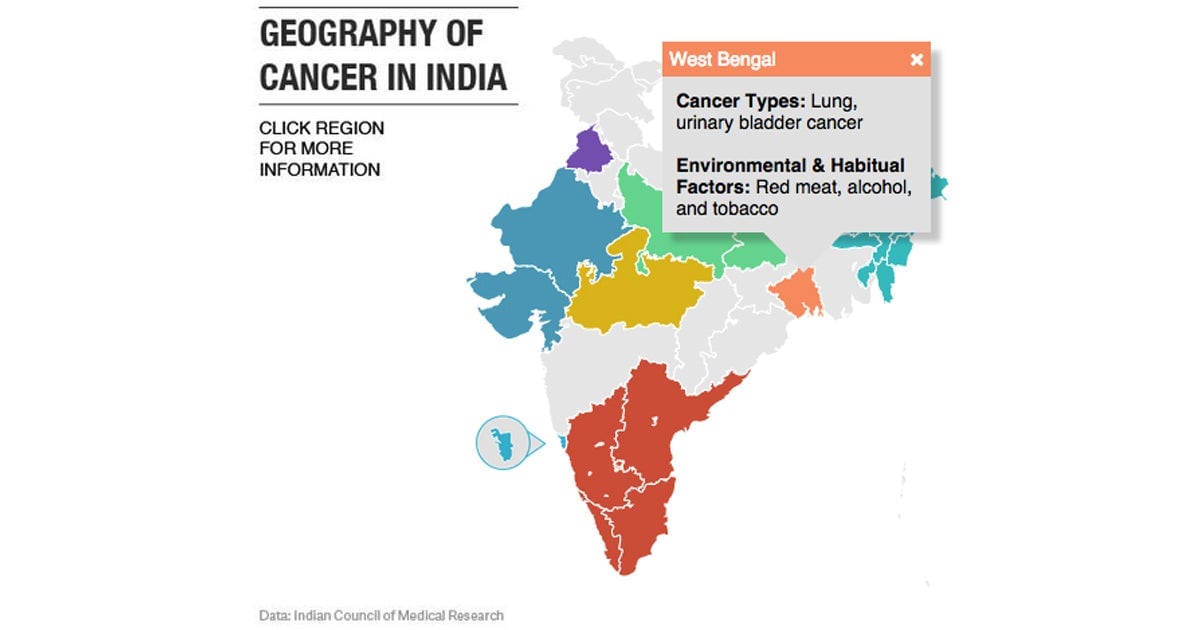Is India prepared for a cancer tsunami?
This article is part of an ongoing BULLETIN series exploring GE’s innovation, technology, and manufacturing initiatives in India.


This article is part of an ongoing BULLETIN series exploring GE’s innovation, technology, and manufacturing initiatives in India.
A cancer tsunami is coming to India. Will the warning signals be sufficient preparation? With two new detections every minute and three deaths every two minutes, the tsunami is already rising.
There are more than three million prevalent cases of cancer in India, though the real number is likely tripled due to a large number of cases left undetected and unreported. India is projected to see 1.23 million new cancer cases a year, with a 20% increase expected by 2020, leading to 1.7 million new cases a year by 2035. While this is alarming growth, other cancer-stricken countries are in the same range with much smaller populations.
The survival rate disparity is stunning. In India, 70% of new cases will lead to death within a year; it can be close to the reverse in the U.S. and elsewhere. Millions are dying from cancer, prematurely, without ever knowing they had the disease.
To address these enormous concerns, the solution must be two-pronged: Indians need to be better educated on the disease and they need to have better, more affordable access to early diagnosis and care.
Disaster management
The rise of this dreaded disease is a major obstacle for human development, well-being, and a country’s economic growth. In 2012, India lost 4.3 million healthy years of life to cancer while GDP was shaved off by 70,000 crores ($12 billion). Urgent and immediate actions are needed to confront this disaster.
Thankfully the Government of India has recognised the alarming growth of this epidemic and has promised investment to build new hospitals and enhance existing infrastructure. An ongoing effort to instill healthy habits and awareness among citizens is in place, but late detection and high death rates demand a specialised technology-driven fight.

For a country likely to see a five-fold increase in cancer by 2025, though, India is shockingly ill-prepared. There are only 1,600 oncologists for India’s population of 1.3 billion, or one oncologist for every 812,500 people, far from the optimal rate of one per 100,000. India produces only 20-25 medical oncologists per year to combat that gap in care when demand requires 100. Due to these shortages, many who encounter and treat cancer sufferers are without qualification. Nearly 80% of patients from rural areas first present their cancer to practitioners with no allopathic qualifications.
Similarly, 40% of India’s 400 cancer centres are located in top six cities. Many of them are not well outfitted, coming up very short on equipment for critical treatments like radiation. Position Emission Tomography/Computer Tomography (PET/CT) is an advanced molecular imaging device required for accurate diagnosing, treatment support, and monitoring the progress of treatment, an essential technology for cancer care. There are only 90 functioning PET/CT units in the country, when more than 1,300 are needed. There is also a lack of early screening programs to help detect cancer at very early stages, when treatment is effective and more affordable. Cancer screening programs have helped reduce at least 25% of cancers in the West.
India needs a concerted effort from everyone in the healthcare industry—healthcare providers, device manufacturers, pharma, NGOs, and the government—to devise practical solutions and build desired infrastructure.
New detection and treatment technology
Discovery IQ is a tool to aid in diagnosis and treatment monitoring of cancer. Announced earlier this year by GE Healthcare, it is a PET/CT system developed in India with the help of local healthcare experts to take India to a healthier future.
Many of Discovery IQ’s new advancements can give cancer care momentum in India. It is designed to be 40% more affordable—and thus accessible—than other models. And its scalability gives Indian healthcare providers the crucial ability to make on-site upgrades and help protect their long-term investment. GE has been working with several partners from the healthcare industry to create innovative solutions for cancer diagnosis and care to be more affordable and accessible. A distribution network for the FDG isotope used for PET/CT imaging was set up with healthcare providers to save costs and spread PET/CT imaging technology to smaller towns. GE is working with global experts to expand cancer diagnosis and treatment centres to tier II cities as well as create a platform where experts can come together to make informed treatment decisions.
In a country where out of pocket payments account for more than three-quarters of cancer expenditures, Discovery IQ PET/CT and the efforts to support it provide increased access, enhanced quality, and more affordable healthcare.
For some time, India felt good about cancer statistics. Not anymore. The data shows that a cancer tsunami is coming. India cannot afford to sit back and continue to let the cancer burden grow. It is time to build upon these inspired initiatives and demonstrate that cancer trends are reversible. GE plans to break these trends globally by partnering with other countries in need of affordable and accessible treatment solutions for their people. Soon, your address and savings account won’t have a direct effect on your life span.
Click here
to answer a few questions about healthcare innovation in India.
This article was produced on behalf of GE by the Quartz marketing team and not by the Quartz editorial staff.